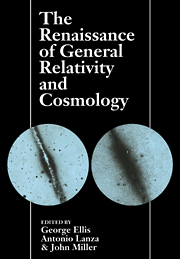 The Renaissance of General Relativity and Cosmology
The Renaissance of General Relativity and Cosmology Published online by Cambridge University Press: 15 December 2009
Quasars offer important clues to the process of galaxy formation and the epoch when it occurred. Although they almost certainly involve relativistic processes close to a collapsed object, quasars have unfortunately not yet given us any real tests of strong-field gravity.
INTRODUCTION
In December 1963, the first Texas Conference on Relativistic Astrophysics was held in Dallas. Quasars had just been discovered, and were already being interpreted as gravitationally-collapsed massive objects. In his after-dinner speech, Thomas Gold said that relativists were “not only magnificent cultural ornaments, but might actually be useful to science …. What a shame it would be if we had to dismiss [them all] again”. We haven't had to do so — on the contrary, ‘relativistic astrophysics’ is a subject with ever-widening scope. It burgeoned with the detection of the microwave background in 1965, of neutron stars in 1967, and of the first stellar-mass black hole candidates in 1971. Dennis Sciama's research group was at the centre of all the key debates throughout that exciting period. I was myself fortunate to begin research in 1964, when these developments were just gaining momentum. It was my great good fortune to have been assigned as one of Dennis' students, and he has been a valued mentor and advisor ever since.
To save this book to your Kindle, first ensure [email protected] is added to your Approved Personal Document E-mail List under your Personal Document Settings on the Manage Your Content and Devices page of your Amazon account. Then enter the ‘name’ part of your Kindle email address below. Find out more about saving to your Kindle.
Note you can select to save to either the @free.kindle.com or @kindle.com variations. ‘@free.kindle.com’ emails are free but can only be saved to your device when it is connected to wi-fi. ‘@kindle.com’ emails can be delivered even when you are not connected to wi-fi, but note that service fees apply.
Find out more about the Kindle Personal Document Service.
To save content items to your account, please confirm that you agree to abide by our usage policies. If this is the first time you use this feature, you will be asked to authorise Cambridge Core to connect with your account. Find out more about saving content to Dropbox.
To save content items to your account, please confirm that you agree to abide by our usage policies. If this is the first time you use this feature, you will be asked to authorise Cambridge Core to connect with your account. Find out more about saving content to Google Drive.